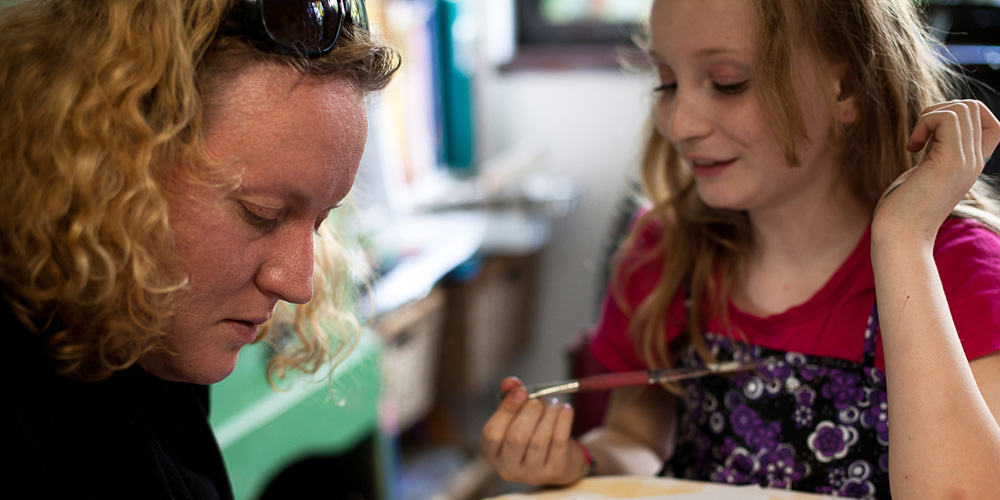Zoë’s invisible disability use to mean that Tracy could not naturally hug her daughter. With the right supports Tracy and Zoë overcame the barrier of sensory processing regulatory disorder.
Tracy Tobin’s eyes well up with tears when she shares how her daughter, Zoë Peterson, sat on her lap and was able to let mom hug her. Never before had Tracy been able to hug her daughter so naturally.
“It’s hard to explain how amazing that is when you can’t do that with your own kid,” she says.
Zoë has a sensory processing regulatory disorder. She is hypersensitive to touch, movement sensation, and awareness of other body positions next to her. An activity such as hugging can overwhelm her senses. The disorder does not affect Zoë’s physical or intellectual ability — her disability is invisible.
Tracy remembers how difficult it was to have other parents, even teachers, pass judgment when Zoë was having what looked like a tantrum —a touch from a passerby can trigger extreme anxiety and screaming. A mom’s natural instinct is always to protect her child, says Tracy, and yet if Zoë falls and hurts herself, Tracy cannot help her daughter up, or even touch Zoë.
Tracy articulates how odd this must have looked to other people. She recalls how hurtful words can be to her, and more so to her daughter, from people who don’t understand invisible disabilities.
Zoë, with the support of her mother and teachers, managed her needs quite well for many years, but at age seven, things changed. Zoë was transferred to a new class, with a new teacher, and a new educational assistant.
The new class didn’t work out and Zoe experienced what Tracy describes as “a mental health breakdown.” She wouldn’t trust anyone, was aggressive when anxious, stopped eating, and dropped 10 pounds off her already tiny frame. The more confidence Zoë lost in school, the more her health deteriorated, and the more isolated she became, trusting only her mom.
It was a difficult time for Tracy, who was working only part time so she could be available if the school called. Soon, without any schooling options, Tracy stopped working and took care of Zoë full time.
Tracy says it wasn’t unusual for Zoë to wake in the middle of the night and scream for hours, so loudly that neighbours four doors down could hear. Tracy’s health also declined from the stress. Confronted with no alternatives but hospital care full-time, Tracy implored the Ministry of Children and Family Development for help.
The Ministry connected Tracy with the BC Centre for Ability. That’s when two critical staff members from the Stepping Stones and Supported Child Development programs began to work with Tracy to restore Zoë’s health.
The Centre started by securing an out-of-school program placement connected to Zoë’s old elementary school. Tracy says the program was instrumental in providing an encouraging routine and socialization for Zoë. In the meantime, her mother showered her with love and support at home, feeding her as much food as possible to help her gain weight.
The Centre’s staff also sought additional resources, including connecting Tracy with family support groups and finding family therapy for Zoë. They provided Tracy with help for daily activities. They also reinforced that Tracy needed to take care of herself so she could take care of her daughter.
Soon, the school principal reached out in hopes of finding ways to bring Zoë back to her school and friends. Zoë secured a place in a new and smaller classroom with additional support.
Returning to school and receiving extra care helped Zoë advance. Her confidence started to take flight. Despite missing five months of school, she caught up on her missed school work. She’s also learned how to manage her behaviour and is no longer aggressive when she feels threatened.
Zoë has a book made by the BC Centre for Ability and a local artist featuring a customized anime character of herself that she can share with others to describe her disability. She is now stretching her independence from her mom, playing at other kids’ homes, and planning for her first sleepover. Zoe’s even enrolled in hip-hop class and enjoys dancing and helping other students.
“It’s a remarkable change,” Tracy says. “She’s now at the place where she can do things she just couldn’t do before.”

